Vietnam veterans speak of hurt, healing at LZ Maryland
TIMONIUM, MD — Fifty years is a long time to wait to hear someone say, “Thank You”. But for many Vietnam veterans hearing those two simple words has seemed as elusive as their obstinate enemies. Last weekend, Maryland Public Television (MPT) capped a multi-year endeavor to say “Thank You” to Vietnam vets with an event simply called LZ Maryland. The two-day tribute, which included displays of military hardware, a Tour of Duty Map, musical entertainment, a stirring motorcycle honor ride and countless opportunities to speak one-on-one with the vets, took place at the Maryland State Fairgrounds in Timonium.
This reporter enjoyed the sights and the sounds of the entire affair but was most anxious to speak directly with the veterans. What follows are twelve brief interviews with some of the men whose lives were forever changed by the war in Vietnam.
* * * * *
Brothers Wayne and William Talbott of Parkton, Maryland, enlisted and volunteered for Vietnam. The twins served from 1969 -1971.
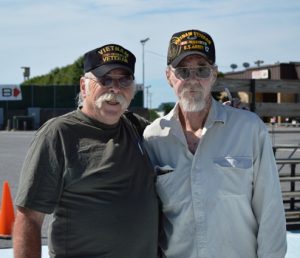
William showed me two fading pictures, saying, “Emotions run pretty high with me. Right now I’m overcome with a feeling of gratitude for being in a country like we have now. You can ask my wife. When I came back in 1971, we were very alone. I isolated myself from everybody. Even to this day, I do. My wife had a cousin who protested the war, but I never had any ill feelings toward him because I figured that was his right. I went and fought in the war, and he said he wasn’t going to go. I never held any animosity towards any of those who didn’t go.”
Wayne Talbott enlisted shortly after his twin, but because of policies pertaining to loss of the Sullivan Brothers, the two were not allowed to be in a combat zone at the same time. “I was attached to MAC V 388 support group and my outfit was the 385th. We were mobile communications so I traveled all over southeast Asia. Wherever we were needed, that’s where we were sent. The VC (Viet Cong) and NVA (North Vietnamese Army) would often single us out because they wanted to knock out anybody who was either setting up or sending communications. They were gunning for us, but luckily we had our s#*t together most of the time.”
What did Wayne Talbott think of the tribute event?
“It’s a long time coming. It’s like, what, 46 years too late? You’ve got to remember, if you know anything about the history of the war, that we weren’t very well liked when we came back. Of course, it’s all water underneath the bridge now, but it’s a long time coming. I know most other vets I talk to feel basically the same way. The younger vets from more recent conflicts got a real welcome home, so some of us still feel we got short-changed.”
We asked Wayne what he would say to today’s men and women who are returning from deployments overseas?
“Fall in with the rest of us. There’s help out there. Join the VA; join the American Legion. Very good outfits, and you can get help there. There’s a VA hotline with someone you can talk with day or night. And don’t feel shy about it. A lot of us didn’t seek help right away. But for the younger guys, we appreciate you, because we know what you went through.”
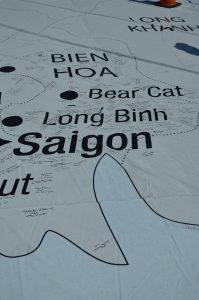
Bernard Wallace of Parkville, Maryland went into the army in June of ‘68. “In December of that year, I landed in Vietnam. I went in at Long Binh, which was a replacement depot, and ended up at Can Tho in the Mekong Delta. We were a specialized communications unit. We provided security devices for radios and teletypes – things like that. We provided them, keyed them, did everything to make them secure.”
Wallace said his most troubling encounter while serving in Vietnam was not with the enemy, but rather with the discovery of an American officer who had an unauthorized secret code book in his possession. The officer’s punishment for this dangerous infraction? “He got a promotion.” Wallace also said the most jarring part of LZ Maryland was walking into the Vietnam Faces slide display and seeing the face of a neighbor who was killed during the war.
Michael Simons, Director of the National Electronics Museum, also noted that radio men were often at higher risk. The museum had a working display of Vietnam-era communications gear set up in the exhibition hall.
“A vet stopped by yesterday and went up to the PRC-74 and just laid his hands on it and started crying. We stood back and waited to see what he was going to say, and he said, ‘One of my buddies was wearing one of these when he was killed.’ It was pretty emotional for us and underscored the reason we are here.”
* * * * *
Don Jestes from Finksburg, Maryland was a dog handler in Vietnam.
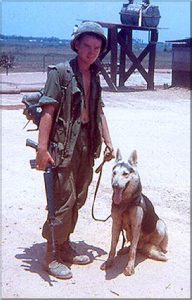
“I went through the draft, like a lot of other guys my age. And I had the opportunity of either being an infantryman or a dog trainer. So I became a scout dog trainer and spent an additional 13 weeks at Scout Dog Training School in Ft. Benning, Georgia. From there, I was shipped to Vietnam and assigned to the 47th Scout Dog Platoon. The 47th was attached to the 101st Airborne Division. I was stationed at a small base camp up near the DMZ called LZ Sally. There were about 13 scout dog handlers there.
“I used a dog I was given when I arrived for maybe 1-2 trips, but he didn’t work out real well, so I asked for and was given another dog. That dog (Rebel) worked out fine. I was fortunate that I didn’t lose anybody in the course of walking point and trying to detect the enemy. We also looked for booby traps and caches of weapons. For me, it worked out well. However, on leaving Vietnam, my dog was assigned to another incoming handler.
“Lack of experience in Vietnam was what got a lot of people killed. His first trip to the field, unfortunately, Rebel was killed, as were seven other GI’s. It was a sad ending, though by the end of the war, any dogs that were left were euthanized. For me and all of the guys who were there, we just took it one day at a time. You’ve got to think positive or else you’ll go crazy thinking about it all of your life.”
* * * * *
Bernard Wallace wasn’t the only veteran who talked about trouble with an officer. But in Elliott Phillips’ case, the troubles went further up the chain of command.
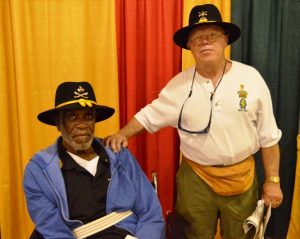
“I went into Vietnam at the same time the guy who was doing Good Morning Vietnam was on the radio. I was doing radio and communications for the 1st Cavalry Division, so if you got on the radio and didn’t know how to talk, I told you to get off of it. I told my commanding general to get off the radio and he didn’t like it, but I had never heard his voice and didn’t know who he was. After six months at that post, they put me in charge of a combat switchboard in the A Shau Valley. There were still unexploded bombs there, and we were being shot at. It wasn’t a very good place to be. I got out at the beginning of the Tet Offensive, so I didn’t catch much of that, but we got enough rockets at the A Shau Valley to satisfy anybody.
“Every evening they would show a movie. Believe it or not, every time they showed Combat! with Vic Morrow, we got shelled. The general said, ‘Don’t show that movie any more’, so we didn’t show it for three months. Then someone decided to show it again one night, and it wasn’t on for ten minutes when here they come; the rockets hit us again. After that, the general said he would court martial anyone who played that film.”
Phillips said it was not uncommon for the NVA to call in fake requests for artillery support, which led to another tiff with an outraged officer.
“The NVA imposters were pretty good at calling in bogus air strikes, even though there were certain words they could not pronounce. I’d ask them to repeat the message or give me a code, which of course they couldn’t do. One day, while they were doing this, a US colonel came on the air and told me to get off the radio. I said, ‘No sir – YOU need to get off the radio’, and he called me on the phone and let me have it. My colonel heard the whole exchange and he was in the office just waiting when the other colonel came busting through the door. ‘Where’s Sgt. Phillips?’ that colonel demanded, but my colonel said, “Look Jim, Sgt. Phillips works for me and I work for the general. When he says, ‘Get off the radio’ he is speaking for the general. Now stay off the radio.’”
* * * * *
Acting as one of the on site docents for the helicopter displays was Allan Hoffman from Greensburo, North Carolina.
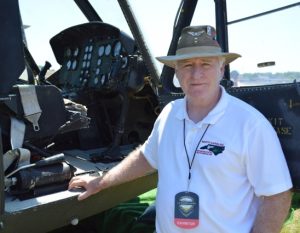
“I think this event is terrific. I think it’s time, even this many years later. It’s just a way for guys to shake hands and say, ‘Yeah, we were there, and we are healing and we’re doing just fine’.
“I was an aircraft commander flying UH-1’s in the central highlands of Vietnam. The Huey was the icon of the Vietnam War because of its distinctive sound and the job it did putting guys in, resupplying them, and then getting them out when they were injured or done with their mission. That’s what we did, that was our job. So we have brothers who were in all the armed forces, because as helicopter crewmen, we were treated specially because they knew we would be there if they needed help.
“I was in for a year, from February 1970- February 1971. In that time I logged 1,012 flying hours.
“They say that ‘68 – the end of ‘70 was the hottest period over there. We were beginning to train the Vietnamese to do our jobs and then signing over the aircraft. The idea there was like in Iraq today. We’re gonna give you the training and the hardware to do the job. Of course, it had the same results that we have today.”
What did Hoffman experience when he returned?
“Well, it was a different time. You were told you probably shouldn’t wear your uniform and you should let your hair grow a little longer. That was the deal. I had to put up with some heckling; people who didn’t know you calling you names, and that was the difficult part. The disrespect. for Vietnam vets. That’s the thing about Vietnam vets. We make sure today’s guys are greeted with a slap on the back and a job well done, because they deserve it just like we did.”
Echoing how times were different – and how much has changed – were David Hollingsworth and Richard Meyers. The two vets met at LZ Maryland while signing the Tour of Duty Map.
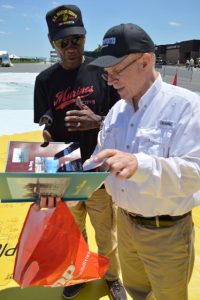
“I landed at Qui Nohn and then was based at Chu Lai. From there we ran our missions going north” said Hollingsworth, who was attached to the 2nd Battalion, VII Marine Division from May of 1965 – June 1967.
Hollingsworth maintained that while there are similarities between Vietnam and the recent actions in Afghanistan and Iraq, there is at least one major difference. “We were led to believe we were going to get in there and get right out.” But Hollingsworth has no regrets for the time he spent in the service.
“For a Black man, being in the Marines opened a world to me I would have never been able to afford. I not only saw southeast Asia, but also the Mediterranean and the Caribbean. Any waters the Marines would be shipped to patrol in case they might be needed, I was there. I went around the world three times and the Marines gave me the financial wherewithal to grow. I also had the opportunity to witness the social change which occurred during my eight years of service.”
Navy veteran Richard Meyers was a member of Coastal Group 11 from May 1970 – December 1971. Meyers worked as an adviser to the Vietnamese Junk Force which patrolled the river at the DMZ. “I went back last year for a private tour of the village where I had lived, and it was a fascinating experience. It brought closure for me because the people were happy and prospering. The shacks were gone and people were living in nice homes and have a good future ahead of them.”
* * * * *
Andrew Giordano was overseas from October 1966 – May 1968. Giordano served in a cavalry unit before becoming a scout in a reconnaissance platoon. Still fit enough to wear a uniform, Giordano recalled the surreal sense he experienced once he returned from Vietnam.
“I had some time left in the military when I came back, so I was stationed at Ft. Meade for a few years. We were reactionary forces for the anti-war protests. There were protests going on every weekend in Washington, so we’d go down there for crowd control around the White House and other national buildings around DC. Many times as I was standing, bayonet fixed, in an echelon line with my back towards the White House and my face towards the protesters, I found myself thinking, ‘Two months ago, I was facing the enemy like this. Now I’m facing my fellow Americans.’”
* * * UPDATE * * *
(In January of 2020, the watchdog group Guardians of the Green Beret contacted the Baltimore Post-Examiner and expressed troubling concerns about the following account by veteran Dan P. Brodt. A subsequent examination of the information provided to us by the Guardians of the Green Beret prompted a further review of Brodt’s Army records. When we contacted Brodt directly to discuss the discrepancies we had uncovered, and asked about the story he told us in 2016, the Honorably Discharged Vietnam veteran admitted he had indeed misrepresented his wartime record and experiences.)
Dan P. Brodt also had a difficult time when he returned to America. Brodt was a sophomore at Towson State when he was drafted into the service. Following his uncle’s sage wisdom, Brodt upped his enlistment by opting for Ranger school. When he was finally deployed to Vietnam, he was assigned to a reconnaissance group which consisted of small teams of men who operated mostly clandestine missions. His first combat mission was as part of a team sent to gather information on the strength of the NVA forces being brought against the Marines who were holding Khe Sahn.
“They flew me to 881 north (one of several strategically important hills surrounding the base at Khe Sahn ). 25,000 NVA troups were pouring down through the DMZ. We flanked them and saw heavy equipment, tanks, artillery; everything the NVA regulars could throw at the III Marines. We reported this to our command and said, ‘You’ve got to get some line troops up here.’ That’s when the air mobile of the 1/7th flew into Khe Sahn in massive force.”
Brodt was in Vietnam during some of the heaviest fighting of the war. He was also there when a very good friend from Gaithersburg – Bill Christman – was killed in action. Brodt completed his two year tour as a member of a black operations team called MACV SOG. When he returned to the states, Brodt says he was totally unprepared for what he encountered.
“We were spit upon, we were called baby killers. Protesters would try to instigate fights in the airport terminal. Two guys in the boarding line jumped out of line and tried to start a physical altercation. It didn’t mean anything to me. I was a Ranger and could have taken these guys out in ten seconds. An Army captain intervened, got me away from the crowd and bought me a beer to allow time for things to cool down. I was finally able to get on the plane and fly home just before Christmas of 1969.”
* * * * *
Rob Penfield was also in Vietnam during some of the most intense fighting of the war. Signing the Tour of Duty Map stirred memories of the Vietnam War; a war which – for many veterans – never really came to an end.
“I was in the army from Tet – early ‘69. I don’t have any specific thoughts on today’s event. I’m surprised I even stopped. I guess it’s like a magnet. As much as you hate it, you can’t shed it. It won’t go away. It never goes away.”
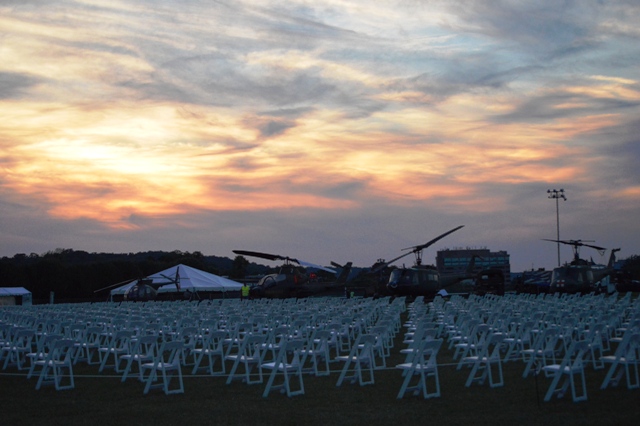

Anthony C. Hayes is an actor, author, raconteur, rapscallion and bon vivant. A one-time newsboy for the Evening Sun and professional presence at the Washington Herald, Tony’s poetry, photography, humor, and prose have also been featured in Smile, Hon, You’re in Baltimore!, Destination Maryland, Magic Octopus Magazine, Los Angeles Post-Examiner, Voice of Baltimore, SmartCEO, Alvarez Fiction, and Tales of Blood and Roses. If you notice that his work has been purloined, please let him know. As the Good Book says, “Thou shalt not steal.”

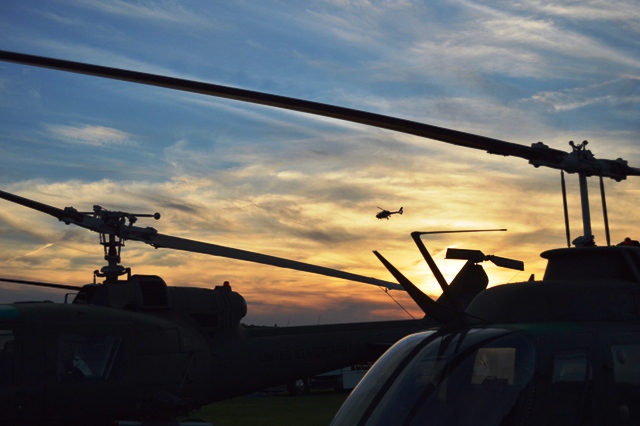
Brodt is a fraud. He was some kind of generator repair guy or microwave installer—he was in Nam, just not the Combat part of it, and certainly not as the claimed; Green Beret, Ranger Special Ops he says he was…absolute Stolen Valor. Get Help Dan Brodt—or grow up and quit play acting as a hero. The fact you served is hero enough.
Thank You Mr. Hayes for this recognition of the “Forgotten War and mostly the Forgotten Soldier”! It is a sad state of affairs that this could happen but you have brought it to some light with your fine article.
It was nice talking to you and hope you do more for us Forgotten Vietnam Veterans.
Dan Brodt
New Market, MD